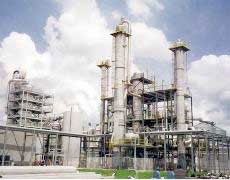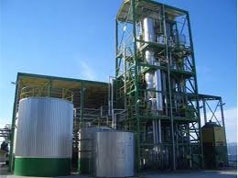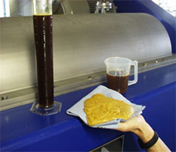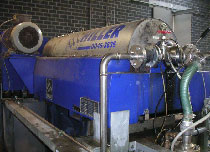Renewable Energies Applications
Hiller machines provide world-class standards for of high-performance decanter centrifuges specially equipped for the separation requirements of the ethanol, biodiesel and other renewable energy industries.

Ethanol: A renewable fuel commonly produced from a variety of biomass feed stocks including corn, Milo, Rice, Wheat / barley and for many years and decanter centrifuge technology has been used for the resulting whole stillage distiller grains & solubles (DGS) distiller dried grains & solubles (DDGS) separation. The growth of ethanol fuels is driven by the desire to reduce dependence on fossil fuels and at the same time reduce carbon dioxide greenhouse gas emissions. Most every industrialized nation throughout North and South America, Europe, and Asia is making an effort to utilize ethanol as a fuel source making efficient ethanol production a prime concern. Advanced biotechnology is applied to optimize yields in the hydrolysis and fermentation process. Following distillation, the whole stillage is separated by decanter centrifuges into wet grains and thin stillage. The thin stillage is concentrated into syrup by evaporation and this syrup is blended with the wet grains prior to thermal drying. The wet grains or the DDGS are utilized as protein enriched animal feed.
Hiller offers the Ethanol industry high capacity decanter centrifuge technology applicable for DDGS whole stillage dewatering. Hiller-US can supply the full range of Hiller DecaPress decanter centrifuges for processing rates associated with 5, 10, 15, and 20 MMGY of ethanol production including machines customized for whole stillage dewatering applications up to 500-gpm. For corn dry milling plants, expected performance is 80-85% recovery of suspended solids with 32-35% dry cake, depending on feed temperature and whole stillage concentration. Normally for wheat, barley and other grains, we can expect the same performance with reduced machine capacity. The Hiller DecaPress decanter centrifuge series has been developed for maximum solids capture and cake dryness at high throughputs with significantly reduced power consumption.

Alternative Fuels and Biodiesel: The use of alternative fuels and recovery of waste vegetable oils and animal fats for biodiesel production is becoming increasingly popular. In turn, the production of bio-ethanol and biodiesels utilizing a wide variety of feed stocks and processes continues to expand. The traditional source of material for biodiesel production has been fresh vegetable oil extracted from plant seeds. However, used edible fats, oils and animal fats are also used. In Northern Europe mainly rapeseed oil is processed. In the USA, it is mainly soya bean oil, while in tropical countries palm oil is the main source of the raw material. This is partly due to rising crude oil prices in the world markets, the development of technologies allowing the generation of new fuels from renewable raw material sources, and the considerable efforts taken by national and international governments and policy makers with regard to climate change protection.
Hiller DecaPress and DecaOil decanter centrifuge technology for renewable energy applications typically include:
- Clarification of new and used oils as raw materials for the production of biodiesel
- Separation of glycerin, fatty acids and salts during the glycerin treatment process
- Separation of methanol and washed salts from glycerin treatment
- Yeast separation during the production of bio ethanol
- Dewatering of fermentation mash after the distillation process
- Dewatering of fermented substrates from biogas production
- Solids removal from screw press filtrates during the pressing of seeds


